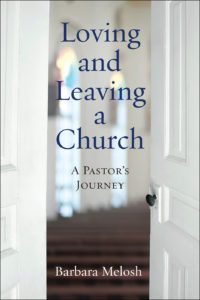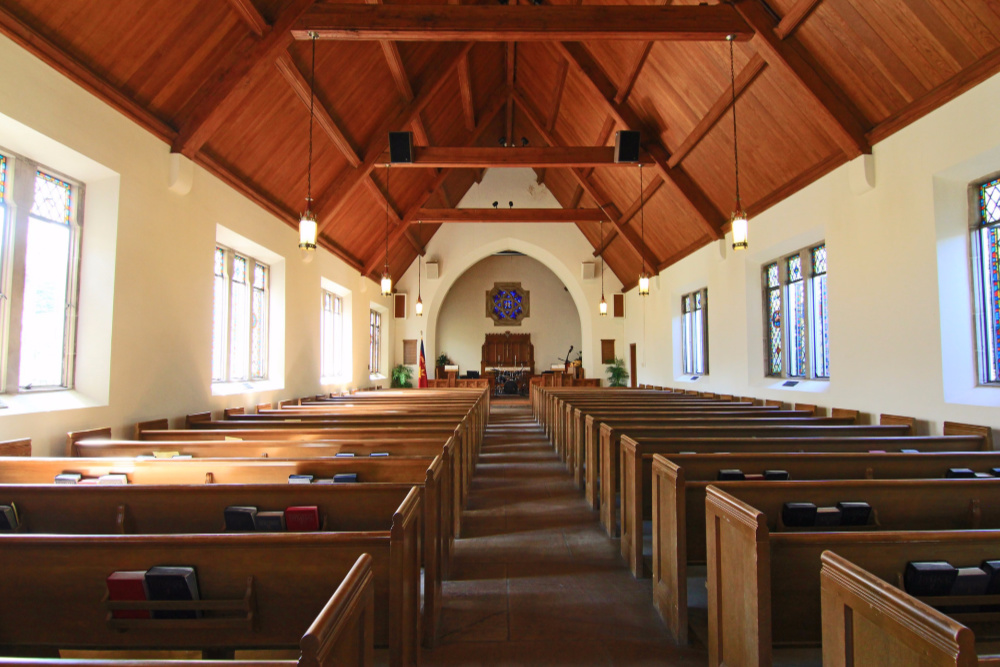Barbara Melosh’s book Loving and Leaving a Church: A Pastor’s Journey tells the story of a second-career seminarian who arrived at her first pastorate with enthusiasm and high hopes. As she engages with the historical congregation in liturgy, pastoral care, and the larger challenges of outreach and attempts at growth, Melosh explores what it means to be a pastor in these times in a mainline church, and how it changes you– maybe more than it changes the congregation. Susan Sink interviewed Barbara Melosh for Bearings Online.
 When you entered your first assignment as a pastor to a congregation whose primary stated goal was to “keep the doors open,” what encouragement did you find in those early days? What did you hope for as a pastor and what did you expect to enjoy about the position?
When you entered your first assignment as a pastor to a congregation whose primary stated goal was to “keep the doors open,” what encouragement did you find in those early days? What did you hope for as a pastor and what did you expect to enjoy about the position?
I had misgivings as I considered accepting this call, concerns deepened by the gentle counsel of those close to me who advised against it. But once I’d said yes, I felt filled with energy and eager to claim this new identity and vocation. I looked forward to visiting people, preaching, worshiping with the congregation, exploring the neighborhood to engage the people around us. Every morning I woke up excited to do the work and curious about what the day would bring.
I had been drawn to pastoral work because I longed for the sustained relationships of congregational life and the call to use more of myself—heart, hands, and head. And now that work was mine! I knew it wouldn’t be easy, but in those heady early days, I felt buoyed by a sense of possibility and blessed to be called pastor.
What did you find most challenging—the liturgical and theological challenges of pastoring or the congregation’s attachment to continuing community life “the way we’ve always done it”?
No question, the real trial came from the congregation’s low energy and resistance to change. A handful of people were ready and willing to try new things, but even they were reluctant to upset those who didn’t want change. In part that was a response of a community that had experienced change as loss—loss of their neighborhood, as they saw it; loss of their children’s prospects, as stable blue-collar jobs disappeared; loss of what had once been a much larger and more vibrant congregation. But I came to see that in many ways they were not much different from more affluent suburban congregations.
Most of us cling to what we know. Many mainline Christians mourn the loss of the imagined glory days. And leaders, surely including myself, do not see a clear way forward ourselves right now, as we seek to be faithful in a culture that is hostile or indifferent to “church.”

In your book, you write that, although you were not successful at growing and revitalizing the church, you and the congregation were successful at being faithful. Could you explain what you mean by that and what comfort it offers?
Sooner or later, our own plans, our own ambitions, our strength, our abilities all fail. The gospel proclaims that we are enough, just as we are.
For me, faithfulness means that I showed up. I did the work I was called to do and loved the people I was given to love, however imperfectly and incompletely. I gave what I had.
As for this congregation and so many others, I am so often moved and humbled by how much people give to their churches—their time, their money, their labor, their steadfast presence. That faithfulness, it seems to me, is what holds us together. Often it is also what holds us back.
Also, you couldn’t help going back and assessing the church you served later in terms of its ever-dwindling congregation and deteriorating physical plant. You said you couldn’t see the difference you had made, which is certainly an honest and sobering assessment. Do we need to rethink our ideas of legacy in the current church, and our ideas of renewal and transformation?
I struggle with this still. It’s hard to resist the judgment delivered by the metrics of money and membership. The truth is, we need a critical mass of both if congregations are going to survive in anything like their current form.
Maybe that whole project of rescue and rebuilding is misguided.
Maybe that whole project of rescue and rebuilding is misguided. I wonder now if we are the seeds that must fall to the ground, so that something new might grow. What the new might look like may have no resemblance to the ideas of renewal and transformation we currently hold, any more than an acorn looks like the oak it might become. Somehow, we need to find ways to live into the radical uncertainty of our lives, held up by the promise that ultimately God will make all things new.
When you left Saints and Sinners, it seemed more like a case of burnout than disaffection. And now you have found a new ministry mentoring pastors. Is mentoring a way of preventing burnout in the challenging environment of contemporary pastoring? Also, what part of your ministry in at Saints and Sinners do you carry with you as you encourage pastors and help them define their aspirations?
Burnout, yes. We were regularly cautioned about burnout in seminary and in continuing education. I knew what I was supposed to do to guard against it. I had friends outside the congregation. I participated in colleague groups. Consulted a coach, met with a spiritual director, found a therapist. Prayed and meditated. Exercised regularly!
Nonetheless, after seven years in the congregation, I was physically and emotionally depleted. Burned out.
In part, overwhelming family circumstances brought me down, a story I have not yet fully told. But the truth is that even under the best of circumstances, ministry is demanding, emotionally costly, and lonely work.
In my current work with colleague groups, I try to encourage pastors in their ministries, to build relationships, to support collaborative work among congregations, and to be available as needed for pastoral care, pulpit supply, consultation, teaching, etc. I hope my colleagues find this support helpful.
But mentoring alone is not enough. We need radical change. A new contract between pastors and congregations about what it means to share mutual ministry. Truth-telling from leaders about the challenges we face in the precipitant decline of mainline congregations, and a commitment to unflinching examination of who we are and who we are called to be. A willingness to let go of what we cherish in “the ways things are” and to discover anew the joy and freedom of the gospel.
In every aging congregation, and maybe every congregation everywhere, a primary ministry is to the sick, dying, and families of the dead. In addition to following the highlights of the liturgical year, your book pauses to closely consider what it means to be with people in times of death and grief. What did you take away from that experience that shapes your understanding of where we are as church communities?
Surprisingly, the primacy of pastoral care is a matter of contestation among some pastors that I know. Many are rightly concerned about congregations that are too inwardly focused, preoccupied only with taking care of their own. Some pastors are trying to reduce their own commitments to pastoral care; the claims of the gospel and the future of the church, they believe, call them to focus more on the community outside the congregation.
Pastors and people are called to care for one another in the loss and suffering that attend every human life.
Surely, we do need new forms of ministry and new ways to be “church.” But I remain strongly committed to the tradition that holds preaching, teaching, and pastoral care at the heart of ordained ministry. Pastors and people are called to care for one another in the loss and suffering that attend every human life.
Around us, social ties are weakening and communities are fragmenting. Congregations are increasingly counter-cultural in this context, as gatherings of people who bear one another’s burdens and commit to some common life. In the end, maybe this is the real treasure we have in these earthen vessels.
Like this post? Subscribe to have new posts sent to you by email the same day they are posted.



“A new contract between pastors and congregations about what it means to share mutual ministry. Truth-telling from leaders about the challenges we face in the precipitant decline of mainline congregations, and a commitment to unflinching examination of who we are and who we are called to be. A willingness to let go of what we cherish in “the ways things are” and to discover anew the joy and freedom of the gospel.”
Amen, what we sorely need indeed. May we have the imagination, integrity and courage to do so.
It’s a hard time to be church–yet full of unexpected blessing too.
Pastor Barbara provided strength and compassion to us while we experienced congregational difficulties. And at the same time personal love and gentle care/prayers during my husband’s illness and then death from cancer. She walked the walk with us.
Pastor Barbara was not only our pastor, she was also our friend. When my younger sister, who had been in the church choir with me, was dying at the young age of 51, Pastor Barbara came to the house to not only pray with me and visit with my sister, but she also, at one of her visits, helped me with her. This was the worst time of my life because I have always been very close to both of my sisters. Losing my little sister was almost too much for me to bear. Pastor Barbara helped me get through this difficult time. Then, just two years later, we had a tragic thing happen on my husband’s side of the family. My sister-in-law and her young daughter were murdered by my sister-in-law’s husband and the father of their daughter. No one had seen this coming. He had been having emotional problems and his mind just snapped. They lived in up-state New York and were never involved in our church, but their bodies were brought to Baltimore and when I asked Pastor Barbara to preach at their funeral, she didn’t hesitate to say yes. This had to be difficult for her, but she did a great job and I’m very thankful to her to this day for her kindness and compassion.
I love these posts.